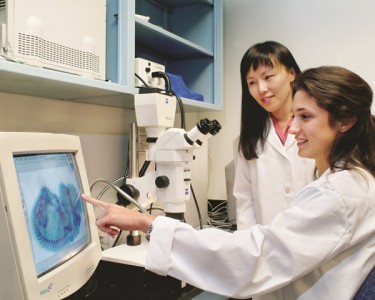By Michael Ferraresi
GCU News Bureau
Grand Canyon University has partnered with Midwestern University on a series of agreements that reserve dozens of seats in medical school and other health care graduate programs for some of GCU’s top students.
GCU's main campus and Midwestern University’s campus in Glendale are separated by 15 miles. But the universities are bound together for the foreseeable future with a dedicated pipeline of GCU students filling spots in Midwestern’s highly competitive graduate programs in osteopathic medicine, podiatry and biomedical sciences and in other health care graduate fields.
By reserving those seats, Midwestern receives a stream of well-trained future doctors and other health care professionals from GCU, which for years has built undergraduate biology programs to prepare students for rigorous graduate program admissions requirements. GCU students have been accepted at some of the top medical schools in the U.S., including those at Harvard University, Cornell University and University of Michigan.
Dr. Mark Wooden, dean of GCU’s College of Science, Engineering and Technology, said Midwestern has become so familiar with GCU’s standards for excellence over the past few years that the new agreement seems like a natural fit.
“They recognize that we are putting out a lot of strong applicants,” Wooden said. “Even without articulations, we’ve put a lot of students in their programs over the past few years.”
Midwestern and GCU have 14 articulation agreements, which document student transfer policies, that reserve as many as 66 graduate program seats in several academic areas.
At Midwestern’s Arizona College of Osteopathic Medicine in Glendale, 10 seats are reserved for GCU students who meet the academic requirements and Medical College Admission Test standards for acceptance. Additional seats are reserved at Midwestern’s Glendale-based programs in podiatric medicine, biomedical sciences, cardiovascular science and clinical psychology (6 seats each), pharmacy (5), physical therapy (4), occupational therapy (3), veterinary medicine (2) and physician assistant (1).
Midwestern has nearly 4,000 students on its Glendale campus and more than 2,900 at its campus in Downers Grove, Ill., west of Chicago, where GCU students can apply for reserved seats in the programs in biomedical sciences and clinical psychology (6 seats each), occupational therapy (3) and physical therapy (2).
University leaders are discussing additional agreements, including placing GCU students in Midwestern’s dental and optometry programs.
Wooden said Arizona faces the challenge of losing talented students to out-of-state medical schools, who then don't return to Arizona to practice. With the Midwestern agreement, more students who want to stay close to their homes or families in Arizona will have the opportunity to do so, he said.
Also, standards for acceptance to Midwestern -- grade-point-average and Medical College Admission Test scores -- will be high for articulation students. So Midwestern potentially could admit GCU graduates who excel in their Midwestern interviews who would be considered excellent candidates at other medical schools, which would help keep top local medical students in Phoenix.
“If a student hits that bar we’ve set with Midwestern, they’re a strong applicant anywhere,” Wooden said.
Dr. Kathy Player, Midwestern’s chief academic officer and vice president of health sciences, characterized the agreements as essential to both universities’ growth.
They’re also a boon to GCU’s medical school applicants, Player said. Some GCU graduates applying to medical schools don't hear from those schools until late in the summer, just before the start of the fall semester. It’s a stressful process that both Midwestern and GCU hope to solve by identifying the most qualified candidates who want to stay close to home.
“It’s like an early admission process specific to GCU students,” Player said. “It keeps them from being put on a wait list to hear the news.”
Like GCU, Midwestern prides itself on smaller class sizes and intimate instructor-student relationships that emphasize state-of-the-art learning environments with real-world or clinical applications of classroom material.
Large state universities frequently share students and resources, often through pipelines between undergraduate programs and graduate programs on separate campuses. GCU and Midwestern officials decided it was time to do the same since both universities share similar philosophies about science-oriented pedagogy.
“It only makes sense to embrace that partnership,” said Player, who joined Midwestern in January after 16 years at GCU during which she served as president, chief academic officer, provost and dean of the College of Business. “I have first-hand knowledge of the high quality students GCU produces and know the high quality programs Midwestern University offers. This partnership creates as seamless a transition as possible between two local private institutions with the mutual goal of producing the best health care professionals dedicated to serving the needs of the future.”
Dr. Perry Baker, associate dean over CSET's health care programs, said Midwestern has a reputation as a private graduate school that develops thoughtful doctors and other health care professionals. He said GCU graduates attending Midwestern likely will find the smaller class sizes and access to professors comparable to what they experienced at GCU.
Baker served as program coordinator and professor of biomedical sciences at Midwestern’s Glendale campus before shifting over to GCU, his alma mater, this summer.
“We’re very much on the same page as far as our philosophies,” Baker said. “Instructors are there because they want to teach as opposed to doing research all the time.”
Reach Michael Ferraresi at 602-639-7030 or [email protected].










































































